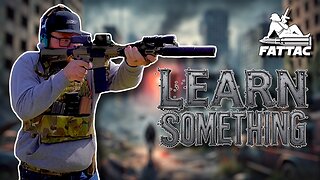Premium Only Content

Cutting Corners: The Dangers of Misinterpreted Opportunities | 1 Samuel 24:4-7
Opportunities that look divine are not always divine.
Welcome to the Daily Devo. I am Vince Miller.
Yesterday, David escaped to the Strongholds of Engedi; Saul pursued him with 3000 soldiers and then exposed himself by relieving himself in the cave David was in. So let's see what happens next in 1 Samuel 24:4-7.
And the men of David said to him, “Here is the day of which the Lord said to you, ‘Behold, I will give your enemy into your hand, and you shall do to him as it shall seem good to you.’” Then David arose and stealthily cut off a corner of Saul's robe. And afterward David's heart struck him, because he had cut off a corner of Saul's robe. He said to his men, “The Lord forbid that I should do this thing to my lord, the Lord's anointed, to put out my hand against him, seeing he is the Lord's anointed.” So David persuaded his men with these words and did not permit them to attack Saul. And Saul rose up and left the cave and went on his way. — 1 Samuel 24:4-7
Three critical moments in this story teach one valuable lesson in spiritual leadership.
First | Misinterpreted Messages
David’s men confidently whisper to David that this is his divine opportunity. They apply an earlier declaration that God had made about the Philistines in Keilah (1 Samuel 23:4) to the present situation. But it's wrongly applied. David's men saw a "divine" opportunity to do something less than divine and altered God’s message to match the present moment. We have all been guilty of this. It’s easy to misinterpret or selfishly interpret promises of God when our emotions are heightened, or we feel cornered. The messages in our minds can be louder than the messages in God's Word.
Second | Stealthy Sword
With remarkable stealth, David manages to sneak up behind Saul while he’s in a vulnerable moment—literally with his pants down—and cuts off a corner of Saul’s robe. We cannot gloss over the fact that David's sword was incredibly sharp (we assume Goliath's sword), and his approach stealthy. Yet, instead of using the sword to chop off Saul's head (as he had with Goliath), he cut a corner of his garment. The deep conviction that struck David was powerful enough that it stopped in his tracks. This required incredible emotional restraint and faith in God. In moments when we hold power in our hands, it’s critical to remember that great power is demonstrated in restraint and faith when we act according to God's will, not our own.
Third | Confronting Counsel
After David crawls back, he speaks to his men about his conviction. He realizes that cutting Saul’s robe, while small in comparison to cutting off his head, was still dishonoring the Lord’s anointed. David tore into his men with a strong rebuke. His allies counseled him to act and David confronted their counsel. Sometimes, our closest allies counsel us toward choices that seem good but violate God’s will. In those moments, we need the courage to question and confront ungodly counsel—even when it seems reasonable and justified.
Opportunities that look "divine" are not always divine.
Opportunities are merely opportunities with two results—a godly result or an ungodly result. In threatening or emotional moments, it's tempting to see a divine moment that is not a divine moment. It is simply a selfish moment deceptively portrayed as divine. This makes me wonder if when David was crawling up behind Saul, he looked down at Goliath's sword and his reflection, thinking to himself:
"Should I use the sword God gave me to cut down the enemy of God's anointed to cut down God's anointed?"
As you are given opportunities today to lead, be cautious, especially when you are emotional or cornered. You might be given an opportunity to do something divine or less than divine. Then do God's will, not your own, because spiritual leadership is only spiritual leadership when it is spiritually alligned with God's Will.
#DivineDiscernment, #SpiritualLeadership, #DavidAndSaul
-
 6:03
6:03
Through the Bible with Vince Miller
2 days agoOrdinary Prayers, Extraordinary Power | James 5:13-18
26 -
 13:37
13:37
Exploring With Nug
13 hours ago $6.39 earnedSUV Found Underwater Searching For Missing Man Jerry Wilkins!
61.9K4 -
 2:58:21
2:58:21
xBuRnTx
8 hours ago1st Warzone Stream Online
44.2K2 -
 6:10:21
6:10:21
JdaDelete
1 day ago $8.31 earnedDino Crisis - Sega Saturday
89K4 -
 23:22
23:22
MYLUNCHBREAK CHANNEL PAGE
1 day agoUnder The Necropolis - Pt 5
81.6K32 -
 2:26:11
2:26:11
Jewels Jones Live ®
2 days agoWINNING BIGLY | A Political Rendezvous - Ep. 108
143K44 -
 2:04:49
2:04:49
Bare Knuckle Fighting Championship
4 days agoBKFC FIGHT NIGHT MOHEGAN SUN FREE FIGHTS
71.3K7 -
 25:09
25:09
BlackDiamondGunsandGear
11 hours agoYou NEED to be Training For Whats to Come
49.3K11 -
 20:03
20:03
Sideserf Cake Studio
17 hours ago $1.76 earnedA HUNGRY HUNGRY HIPPOS CAKE THAT ACTUALLY WORKS?
46.5K13 -
 23:51
23:51
marcushouse
18 hours ago $1.60 earnedStarship’s Next Move Is Coming Sooner Than You Think!
33.7K6